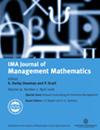收入增长、预测和股票估值
IF 4.3
3区 工程技术
Q3 MANAGEMENT
引用次数: 0
摘要
摘要本文表明,在股票估值的背景下使用公司收入增长的预测可能导致公司股票的定价过高,这与金融分析师报告的“乐观偏见”一致。收益不稳定、收入增长快、系统风险低的公司容易出现较大的估值误差。为了解决这个问题,我们开发了一种新的企业价值估计方法,以纠正预测收入增长的偏差。在各种性能指标下,新估计器明显优于传统的价值估计器。为了支持管理决策,我们构建了公司价值和隐含资本成本的封闭式置信区间,这些置信区间考虑了收入增长的不确定性。本文章由计算机程序翻译,如有差异,请以英文原文为准。
Income growth, forecasting, and stock valuation
Abstract We show that using forecasts of a firm’s income growth in the context of stock valuation can lead to overpricing of the firm’s stock, which is consistent with ‘optimism bias’ reported among financial analysts. Firms with volatile earnings, high income growth and low systematic risk are prone to larger valuation errors. To address this issue, we develop a new estimator of the firm value that corrects for the bias from forecasting income growth. The new estimator is significantly superior to the traditional value estimator under various performance measures. To support managerial decision-making, we construct closed-form confidence intervals for the firm value and the implied cost of capital that account for uncertainty in income growth.
求助全文
通过发布文献求助,成功后即可免费获取论文全文。
去求助
来源期刊

IMA Journal of Management Mathematics
OPERATIONS RESEARCH & MANAGEMENT SCIENCE-MATHEMATICS, INTERDISCIPLINARY APPLICATIONS
CiteScore
4.70
自引率
17.60%
发文量
15
审稿时长
>12 weeks
期刊介绍:
The mission of this quarterly journal is to publish mathematical research of the highest quality, impact and relevance that can be directly utilised or have demonstrable potential to be employed by managers in profit, not-for-profit, third party and governmental/public organisations to improve their practices. Thus the research must be quantitative and of the highest quality if it is to be published in the journal. Furthermore, the outcome of the research must be ultimately useful for managers. The journal also publishes novel meta-analyses of the literature, reviews of the "state-of-the art" in a manner that provides new insight, and genuine applications of mathematics to real-world problems in the form of case studies. The journal welcomes papers dealing with topics in Operational Research and Management Science, Operations Management, Decision Sciences, Transportation Science, Marketing Science, Analytics, and Financial and Risk Modelling.
 求助内容:
求助内容: 应助结果提醒方式:
应助结果提醒方式:


